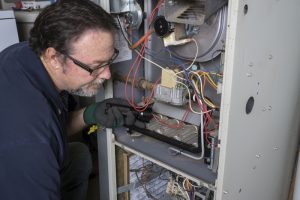 Okay, nobody wants a furnace problem at all. But there is one in particular that should be avoided more than the rest due to the potential hazard it brings—and that is a cracked heat exchanger.
Okay, nobody wants a furnace problem at all. But there is one in particular that should be avoided more than the rest due to the potential hazard it brings—and that is a cracked heat exchanger.
If your home is like the majority in Salt Lake City, it’s very likely that you’re using a gas-powered furnace to heat your home. Gas furnaces not only provide a large amount of heat, but they do so at less expense than electric heating systems, since natural gas costs less than electricity per unit.
But any natural-gas appliance, while built with safety features and customer safety in mind, has the potential to develop hazards. We don’t say this to alarm you, especially if your furnace is well maintained and on the newer side. However, we definitely do want you to be aware of the danger of a cracked heat exchanger.

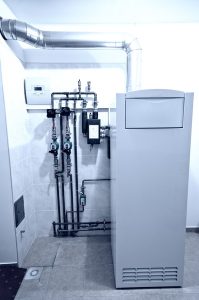 If you’re reading this now, it likely means you are facing an unexpected problem with your heating system. We’re sorry, we know that’s quite the inconvenience, to put it lightly. The good news is, when you work with our team, you can rest assured that you’ll be matched with a professional who knows a thing or two about heating systems and what the best course of action to take is with your heater.
If you’re reading this now, it likely means you are facing an unexpected problem with your heating system. We’re sorry, we know that’s quite the inconvenience, to put it lightly. The good news is, when you work with our team, you can rest assured that you’ll be matched with a professional who knows a thing or two about heating systems and what the best course of action to take is with your heater.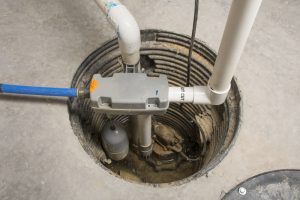 In some areas of the country, homeowners have no idea what a sump pump even is, and they never really need to know. Their homes may be in a position that flooding is unlikely, or that their home doesn’t have a low enough point that it would be impacted—such as a basement or crawlspace.
In some areas of the country, homeowners have no idea what a sump pump even is, and they never really need to know. Their homes may be in a position that flooding is unlikely, or that their home doesn’t have a low enough point that it would be impacted—such as a basement or crawlspace. It doesn’t mean anything good. No, your furnace is probably not going to explode. In fact, that’s not at all what’s going to happen. But a booming furnace, or a noisy furnace period, is a definite sign that you’re in need of a professional
It doesn’t mean anything good. No, your furnace is probably not going to explode. In fact, that’s not at all what’s going to happen. But a booming furnace, or a noisy furnace period, is a definite sign that you’re in need of a professional  It may very well be, but the good news is, it’s never too late for a
It may very well be, but the good news is, it’s never too late for a 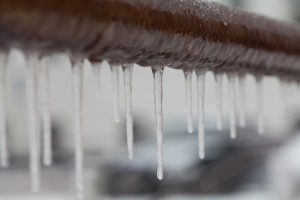 The weather is getting progressively colder and drier, leaving many homeowners to scramble to make their HVAC maintenance calls if they haven’t already, or ensuring their indoor air quality equipment is in good shape to get the through the season. But as temperatures drop, be sure you don’t forget one other very important system in your home—the plumbing system.
The weather is getting progressively colder and drier, leaving many homeowners to scramble to make their HVAC maintenance calls if they haven’t already, or ensuring their indoor air quality equipment is in good shape to get the through the season. But as temperatures drop, be sure you don’t forget one other very important system in your home—the plumbing system.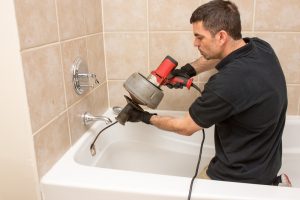 First, let’s get one thing straight. A professional plumber is going to clear your drains more successfully than you can. We understand that clogs happen and that they’re annoying when they do. However, when homeowners try to handle clogs in their homes, they reach for a store-bought drain cleaner, which is not going to do them any favors.
First, let’s get one thing straight. A professional plumber is going to clear your drains more successfully than you can. We understand that clogs happen and that they’re annoying when they do. However, when homeowners try to handle clogs in their homes, they reach for a store-bought drain cleaner, which is not going to do them any favors. 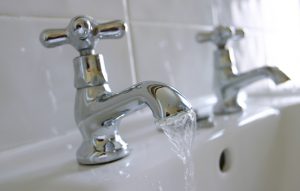 You may have heard the term hard water at some point or another, but maybe don’t know what it actually is. Hard water is water that has a high presence of minerals in it—namely, calcium and magnesium. These minerals are harmless to your health, but the same cannot be said for your plumbing system. Your pipes and your quality of life can suffer in a number of ways due to hard water. Here are some of them:
You may have heard the term hard water at some point or another, but maybe don’t know what it actually is. Hard water is water that has a high presence of minerals in it—namely, calcium and magnesium. These minerals are harmless to your health, but the same cannot be said for your plumbing system. Your pipes and your quality of life can suffer in a number of ways due to hard water. Here are some of them: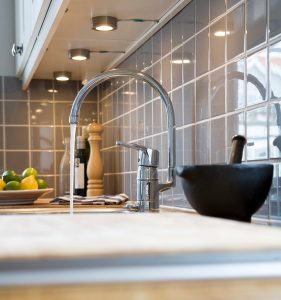 Whether it’s a “tap-tap-tap” you hear, a slow drip, or a quiet rush of water even though no plumbing appliances are running, you know it means you probably have a leak—one of the most annoying problems for homeowners to face. After all, even a “minor” leak such as a dripping faucet can waste gallons of water over time. Small leaks trick you into thinking they really aren’t a big deal—until the costs on your water bill start to add up.
Whether it’s a “tap-tap-tap” you hear, a slow drip, or a quiet rush of water even though no plumbing appliances are running, you know it means you probably have a leak—one of the most annoying problems for homeowners to face. After all, even a “minor” leak such as a dripping faucet can waste gallons of water over time. Small leaks trick you into thinking they really aren’t a big deal—until the costs on your water bill start to add up. The gentle hum of your heating system as you start it up is, of course, nothing to be alarmed about. After all, you know the normal noises of your heating system, which means that you can typically tell when something is “off.” A strange noise doesn’t automatically mean you have a heating emergency on your hands, but it is definitely something to pay attention to, and call for
The gentle hum of your heating system as you start it up is, of course, nothing to be alarmed about. After all, you know the normal noises of your heating system, which means that you can typically tell when something is “off.” A strange noise doesn’t automatically mean you have a heating emergency on your hands, but it is definitely something to pay attention to, and call for 
